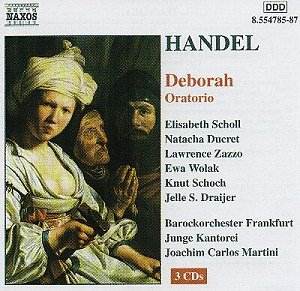You may have read or heard bad reports about Deborah. But tread
carefully, and be warned: if you give this modestly-priced issue a miss,
you’ll be depriving yourself of some truly wonderful music, expertly executed.
Deborah was Handel’s second oratorio, a failure
(Winton Dean famously but misleadingly declares) sandwiched between
two successes, Esther and Athalia. Composed at a critical
turning point in Handel’s career, when he had all manner of problems
to contend with on the operatic front and the new genre of oratorio
looked likely to be a much better prospect for him, Deborah was
written (or rather put together) at an incredible pace, even by Handel’s
amazing standards: the whole project (from inception to public performance)
was despatched in a couple of months. I say ‘put together’ because the
score relies heavily on earlier compositions: Handel lovers will have
a field day tracking down three of the Chandos Anthems (most notably
O praise the Lord with one consent), parts of the solo cantata
Tu fedel? tu constante?, Dixit Dominus, the Brockes
Passion and Music for the Royal Fireworks, not to mention
‘borrowings’ from Tolomeo, Athalia, Israel in Egypt and Belshazzar.
Samuel Humphreys (who also provided texts for Esther and
Athalia) was responsible for the hastily-concocted libretto,
which makes a rather feeble drama out of the (skeletal, and hardly promising)
story of Deborah in Chapter 5 of the Book of Judges; and he does himself
no favours with his unintentionally humorous rhyming couplets.
As often as not, then, Deborah has been described
(or dismissed) as a pasticcio, with little musical or dramatic
integrity. But it’s nevertheless full to the brim of the grandest and
most memorable Handel: the sum of its parts may be nothing to shout
about, but many of its parts are fashioned from pure gold!
This Naxos team has already given us admirable versions
of Athalia and Il Trionfo del Tempo e della Veritè.
It’s very obviously recorded at a (single and more or less unedited?)
public performance: so you’ll have to forgive a certain amount of stage
and audience noise, one or two blemishes of ensemble – seldom serious,
it is true – and (in Part III especially) some strained and tired-sounding
voices, most especially in the chorus.
Joachim Carlos Martini is obviously a conscientious
and intelligent musician. Like Robert King before him (in the only other
recording currently available, on Hyperion CDA66841/2), he opts for
the overture used in the 1744 revival, as only a continuo part survives
of the original overture. Acknowledging that we cannot be certain of
what the first performance did or did not include, he also picks and
chooses items from the various editions and texts (among them Chrysander,
Bernd Baselt and Robert King himself) available to him.
Without exception, the soloists sing with conviction,
clarity and style. Scholl and Zazzo deserve a particular mention for
their presence and conviction: Schoch is marginally less secure, and
evidently less certain of his English pronunciation. The orchestra uses
original or copied instruments, and seem completely at home in this
music, playing as they do for the most part with polish and dexterity.
Only the chorus seem in any way tested or stretched by this music, but
their flair and obvious enjoyment go some way to making up for their
rough edges. And it has to be said that there is some exceptionally
elaborate music for them to sing here, including some complex eight-part
and antiphonal material in the very best Handelian choral tradition.
The sound is bright, weighty and spacious: despite
the reverberation, textures are mostly clear and words usually discernible.
The CDs are extensively indexed, and the booklet includes a full text.
If you’re a Messiah lover who’s curious about
Handel’s other oratorios, this might seem an odd choice for branching
out: but you’ll not be disappointed if you do so. The same goes for
serious collectors of Handel’s oratorios: buy this, and hear for yourself
just how good Handel’s ‘failures’ are!
Peter J Lawson
See also review by Roy
Brewer


